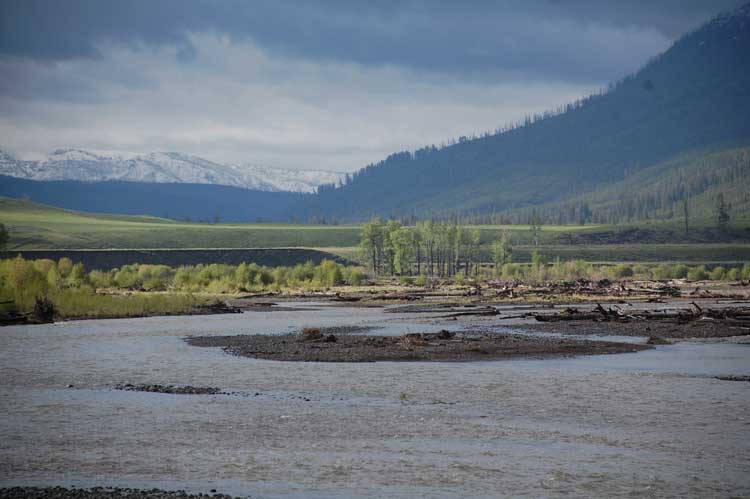
One of the field sites for Jennifer Schweitzer’s research lies in a grove of trees near Yellowstone National Park.
Sometimes a researcher can search far and wide for the perfect collaborator, only to discover the ideal person in their own academic backyard.
Such was the case for Jennifer Schweitzer, professor in ecology and evolutionary biology at the University of Tennessee (UT), and Wellington Muchero, a plant geneticist in the Biosciences Division at the Oak Ridge National Laboratory (ORNL). They met about a year ago at a SPARKS event sponsored by UT’s Office of Research and Engagement (ORE).
SPARKS stands for “Seeking Partnerships to Advance Research, Knowledge and Science.” The goal is to bring faculty together around a topic and initiate new collaborations. Schweitzer and Muchero met at a “Genes to Ecosystems” SPARKS event, designed to connect UT biology faculty to this ORNL initiative.
They both presented lightning talks about their research. Schweitzer highlighted the most recent work from her and collaborators, including Joe Bailey also from EEB from cuttings of thousands of trees representing 25 geographical locations across the western U.S. showing landscape-level patterns in timing of leaf out. Muchero discussed his molecular studies of related species. Her work is in natural ecosystems, and his in the lab and controlled environments.
When their turn came up to talk briefly during the speed networking sessions, Muchero told her, “We really need to start collaborating – right now.”
He explains that he had been searching for collaborators just like Schweitzer and Bailey across the entire US. His team had made a significant discovery at the DNA level, and he wanted to see if it worked in the “real world.”
“We found a DNA mutation that affects when plants will leaf out,” Muchero says. “This is very important from a bioenergy perspective. We want plants to leaf out as soon as possible, which creates more biomass,” he explains. By bringing the two researchers together, for the first time they can study the range of science all the way from the molecules to real-world ecosystems, he says.
In March 2020, the two led a team to submit a proposal to the Systems Biology Research to Advance Sustainable Bioenergy Crop Development research program at the U.S. Department of Energy (DOE) Biological and Environmental Research. More importantly, Schweitzer says, they’ve built a long-term relationship as a result of the SPARKS event.
“The SPARKS event was just the thing that put us together with the people we needed, at the right time in the right place. The event really did spark the relationship. For example, they have submitted two proposals together and Wellington is now serving on a committee for one of my graduate students,” Schweitzer says.
Muchero expressed gratitude to ORE for hosting such an event, and suggest that similar UT/ORNL meetings should be held on a regular basis. “We were out there looking, and it’s mind-boggling that Jen was right next door with everything we could have dreamed of. Her years of studying natural ecosystems and documenting their leafing-out trends provides a perfect test platform for us to see if our DNA-based predictions hold true,” he says.
Both researchers also commended the professional support provided to the DOE proposal effort, especially that provided by Marie Penn, sponsored programs administrator.
While writing science is often thought to be the most difficult part of a proposal, the challenge is in compiling all of the administrative documents and appendices, making sure budgets match, properly formatting CVs, et cetera. For example, on this project, Penn had to coordinate budgets from two institutions with different operational procedures, a task greatly appreciated by the entire research team.
Both Muchero and Schweitzer encourage their colleagues to tap the research development resources available to them in the ORE. “For us, it helped create the perfect match,” Schweitzer says.
For more information on proposal support or future SPARKS events, contact avcrd@utk.edu or visit the research development webpage.